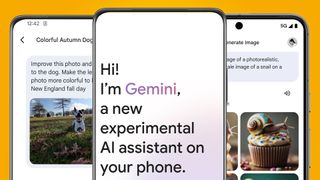Google isn’t done trying to demonstrate Gemini’s genius and is working on integrating it directly into Android devices
Google is preparing Gemini to be the AI helper you seek - on or offline

Google’s newly reworked and rebranded family of generative artificial intelligence models, Gemini, may still be very much at the beginning of its development journey, but Google is making big plans for it. It’s planning to integrate Gemini into Android software for phones, and it’s predicted that users will be able to access it offline in 2025, according to a top executive at Google’s Pixel division, Brian Rakowski.
Gemini is a series of large language models that are designed to understand and generate human-like text and more, and the most compact, efficient model of these is Gemini Nano, intended for tasks on devices. This is the model that’s currently built and adapted to run on Pixel phones and other capable Android devices. According to Rakowski, Gemini Nano’s larger sibling models that require an internet connection to run (as they only live in Google’s data centers) are the ones expected to be integrated into new Android phones starting next year.
Google has been able to do this thanks to recent breakthroughs in engineers’ ability to compress these bigger and more complex models to a size that was feasible for use on smaller devices. One of these larger sibling models is Gemini Ultra, which is considered a key competitor to Open AI’s premium GPT-4 chatbot, and the compressed version of it will be able to run on an Android phone with no extra assistance.
This would mean users could access the processing power that Google is offering with Gemini whether they’re connected to the internet or not, potentially improving their day-to-day experience with it. It also means whatever you enter into Gemini wouldn’t necessarily have to leave your phone for Gemini to process it (if Google wills it, that is), thereby making it easier to keep your entries and information private - cloud-based AI tools have been criticized in the past for having inferior digital security compared to locally-run models. Rakowski told CNBC that what users will experience on their devices will be “instantaneous without requiring a connection or subscription.”

A potential play to win users' favor
MSPowerUser points out that the smartphone market has cooled down as of late, and some manufacturers might be trying to capture potential buyers’ attention by offering devices capable of utilizing what modern AI has to offer. While AI is an incredibly rich and intriguing area of research and novelty, it might not be enough to convince people to swap their old phone (which may already be capable of processing something like Gemini or ChatGPT) for a new one. Right now, the makers of AI hoping to raise trillions of dollars in funding are likely to offer versions that can run on existing devices so people can try it for themselves, and my guess is that satisfies most people’s AI appetites right now.
Google, Microsoft, Amazon, and others are all trying to develop their own AI models and assistants to become the first to reap the rewards. Right now, it seems like AI models are extremely impressive and can be surprising, and they can help you at work (although caution should be heavily exercised if you do this), but their initial novelty is currently the biggest draw they have.
These tools will have to demonstrate continuous quality-of-life improvements to be significant enough to make the type of impression they’re aiming to make. I do believe steps like making their models widely available on users’ devices and giving users the option and the capability to use them offline is a step that could pay off for Google in the long run - and I would like to see other tech giants follow in its path.
Get the best Black Friday deals direct to your inbox, plus news, reviews, and more.
Sign up to be the first to know about unmissable Black Friday deals on top tech, plus get all your favorite TechRadar content.
YOU MIGHT ALSO LIKE...
Kristina is a UK-based Computing Writer, and is interested in all things computing, software, tech, mathematics and science. Previously, she has written articles about popular culture, economics, and miscellaneous other topics.
She has a personal interest in the history of mathematics, science, and technology; in particular, she closely follows AI and philosophically-motivated discussions.
Most Popular

